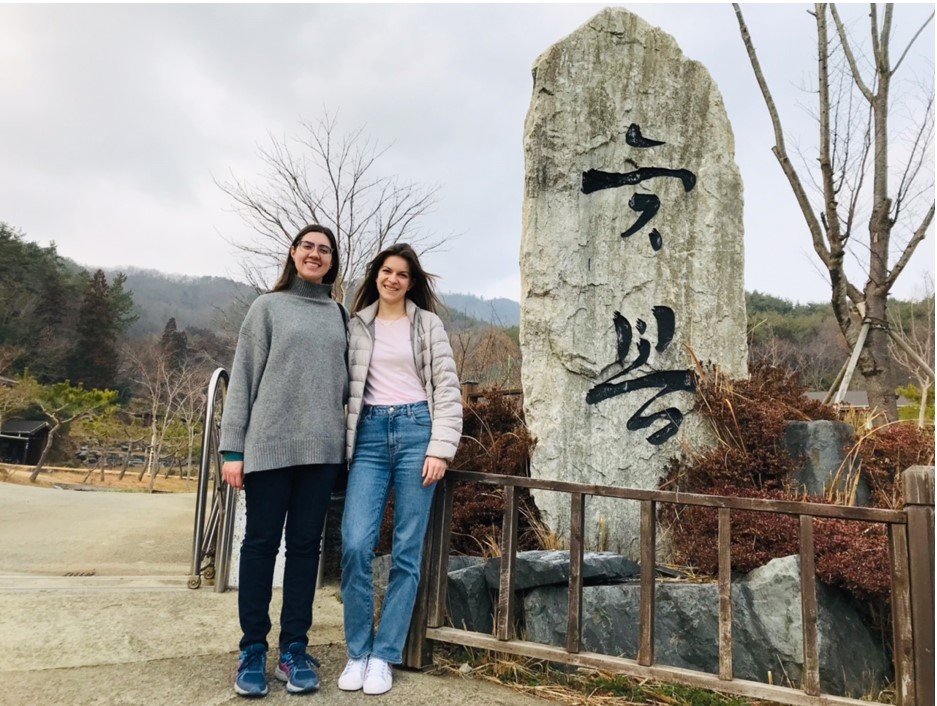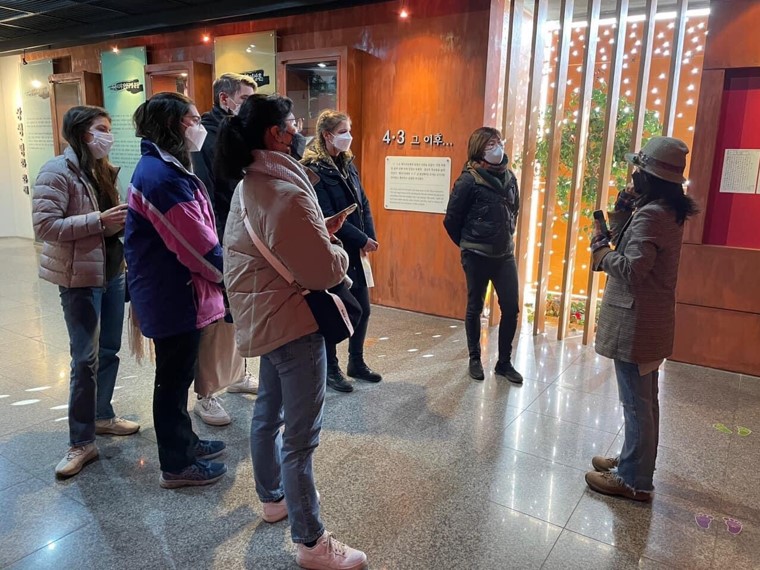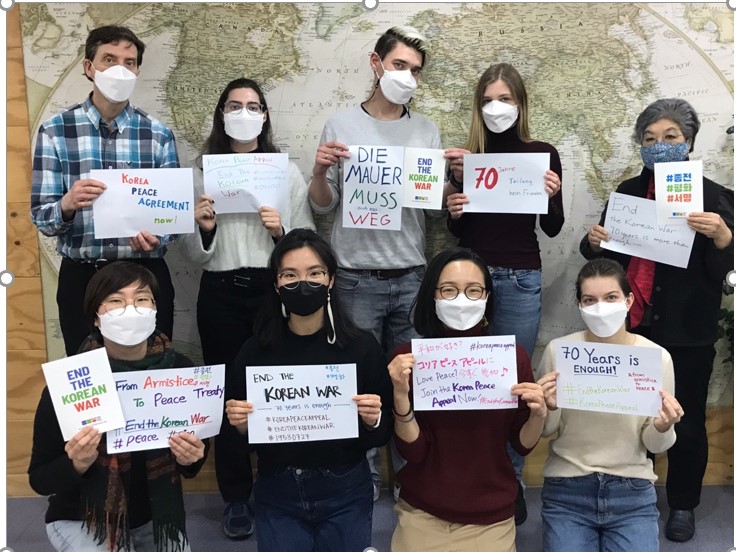A Letter from Kurt Esslinger and Hyeyoung Lee, serving in Korea
Winter 2022
Write to Hyeyoung Lee
Individuals: Give online to E132192 in honor of Kurt Esslinger and Hyeyoung Lee’s ministry
Congregations: Give to D500115 in honor of Kurt Esslinger and Hyeyoung Lee’s ministry
Churches are asked to send donations through your congregation’s normal receiving site (this is usually your presbytery)
Subscribe to our co-worker letters
Dear friends,
Grace and Kate, the two Korea YAVs, have had to say goodbye to the community and friends that they have grown close to in Seoul and have relocated from Seoul to Gangjin, located in the southern tip of Korea, which is about a six-hour drive south from Seoul. After spending the first half of their YAV year in Seoul, the capital of South Korea where they enjoyed working at the children’s center and reunification house in a major urban city, they now get to spend the rest of their time serving in a rural area working with an alternative high school. They transitioned down to the school on March 1, arriving at Neut Bom (Late Spring) Moon Ik Hwan School. The school is named after Rev. Moon Ik-hwan (1917-1994), a pastor from our partner denomination, the Presbyterian Church in the Republic of Korea (PROK), who worked actively with the democratization and reunification movement. This school provides an alternative curriculum for seventh through 12th grades and has three educational philosophies: life and spirituality, autonomy and community, and unification and peace. The school has been carrying out educational activities focusing on liberal arts, community education, history education, and independent education according to these three philosophies. Grace and Kate will live with a community of students and teachers and participate in the school curriculums and attend a local church to learn and grow together with the faith community.
I would like to tell you a little more about the communities that the YAVs have been involved with in the first part of their YAV year to illustrate the kinds of activities and learning they have been involved in. One of the most impactful activities has been the ecumenical mission co-workers’ group from overseas. Every Friday at 2 p.m. this group got together to learn about the history of Korea, the peace and reconciliation movement, and how Korean churches were involved in these activities. The participants in this program are short-term and long-term mission co-workers from Germany, Japan, Canada and the U.S.A. who have come to Korea to work with Korean church partners. Our two YAVs joined this program early in their YAV year. Learning together with these members has been an excellent opportunity for us to think about what it means to work for peace as Christians from various backgrounds. At the final in-person meeting with the ecumenical mission co-workers’ group, we reflected on the following questions about our group activities together:What have we seen? Beauty, dancers, tangerines, pain, death, darkness, 4.3. museum, naval base, North Korea, DMZ, the ocean, mountains, cranes, people, endurance, and sufferings
What have we heard? Music, singing, screams, shouts, cries, longing for peace on the Korean Peninsula, history of Korea, voices, crying, laughter, the suffering of people, personal stories, and great presentations
What have we smelled? Cows and goats, earth, snow, ocean, good food, coffee, popcorn, fresh air, and tangerines
What have we felt? Joy, anger, connection, sadness, transformation, discomfort, frustration, thoughtfulness, feeling torn, tired, thankfulness, and safety
Where did we see God? In hopeful and faithful people, when we did the peace dance at Gangjeong Village, victims helping others around the world, hope for change, among us, the sunrise when we joined the 100 bows, in people’s resilience and capacity for forgiveness.
As part of the program, we have invited several organizations working for the ecumenical movement to join us. These groups included Korean young adults promoting peace, justice and the reunification movement. We heard about how the Korean Christian young adults historically have been an active part of this movement and continue to be actively engaged. We also took two study trips to the Demilitarized Zone (DMZ) and Jeju Island to hear the stories of people suffering from the division of the two Koreas. During the trip to the DMZ, we met with peacemakers who live in Cheorwon, a border village near the DMZ area, to learn about their peace activism. Together, they climb up Soi Mountain to look across the peaks to North Korea.
At Jeju Island, we learned about the years that led up to the Korean War when the U.S. occupied the southern Korean zone from 1945-1950 and what happened in those five years before the war broke out in June of 1950. We especially learned of the tragic massacre of the Jeju Islanders at the hands of the South Korean government. “The April 3rd Uprising and Massacre” was a tragic incident that happened between March 1, 1947 and September 21, 1954 on Jeju Island. It was a chaotic period right after the independence from Japan and the Korean Peninsula signaled the start of the Cold War. We learned about stories of Jeju people who continue to struggle today for the truth to be acknowledged about the response to the April 3rd Uprising, so that reconciliation and healing might occur.
Participants of this program also had the opportunity to do their own research about issues that are related to the Korean War or the democratization movement. Each participant picked their own topic to present to the group.
For our final activity for the in-person meeting, we joined the Korea Peace Appeal signature campaign to promote an end to the Korean War. The Korea Peace Appeal is an international campaign that seeks to amplify voices calling for an end to the Korean War and a transition from armistice to peace beyond the Korean Peninsula and throughout the world. Participating in this campaign came as a request from our partner, the National Council of Churches in Korea (NCCK). We would like to urge our supporters in the U.S. to also join us in this signature campaign. The campaign aims to end the Korean War and achieve peace on the Korean Peninsula by collecting 100 million signatures of the Korea Peace Appeal from 2020, the 70th anniversary of the outbreak of the Korean War, through 2023, the 70th anniversary of the armistice agreement.
In light of the war in Ukraine, we are witnessing that war is not the answer for peace, and it causes a lot of pain and suffering for people. Let us say NO to war and promote peace instead.
Please join us to sign the signature to end the Korean war. We thank you for all the support you have given us as we continue to work in solidarity with you and our partners in Korea. Your prayers and donations have meant so much to us. As you consider supporting the Korea Peace Appeal campaign with your signatures, please continue to support us with your prayers.
Sign here. https://en.endthekoreanwar.net/
Hyeyoung and Kurt
![]() You may freely reuse and distribute this article in its entirety for non-commercial purposes in any medium. Please include author attribution, photography credits, and a link to the original article. This work is licensed under a Creative Commons Attribution-NonCommercial-NoDeratives 4.0 International License.
You may freely reuse and distribute this article in its entirety for non-commercial purposes in any medium. Please include author attribution, photography credits, and a link to the original article. This work is licensed under a Creative Commons Attribution-NonCommercial-NoDeratives 4.0 International License.


